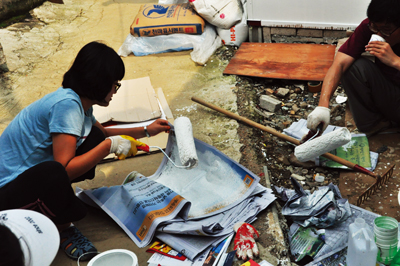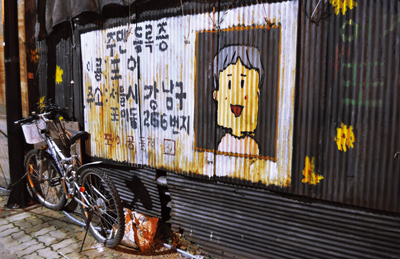
Residents are at the crisis of being kicked out as the government intends to rebuild the area into a new town site, making the atmosphere more intense.
Amidst this chaos, Shin Ji-hae (’06, Sociology) resides at Poi-dong with the residents as a teacher, volunteer, friend, helper, and to some even a mother. She was following what she believed was more valuable rather than stable future.
“My parents expected me to take the Civil Service Examination for ‘helping people in need at a national level’ and further my own career,” Shin said.
However, Shin stoutly chose to help the impoverished instead by sharing the hardships of the people together. Right after graduating Ewha this February, Shin headed to Poi-dong and settled down there.
Shin’s first visit as a volunteer to Poi-dong in 2007 was possible because of a hand-written poster of the Peace Camp posted in one of the bathrooms on Ewha campus.
Then, this June, a stupendous fire tore down the 75 houses in the village of Poi-dong. When Shin visited there again after the fire accident, it was “shocking and heart-aching” for her to see people living in what they called “temporary settlement,” which looked more like pieces of wooden boards and rocks piled upon mud.
“The scenery of the burnt-down village was imprinted,” Shin said. “Thoughts and worries of the children living there did not leave my mind even for a moment. It was then when I realized I should go back and help.”
According to Shin, there were similar cases of areas being authorized, destroyed, and replaced with new apartments by the government before in Seoul.
“The original residents were forced to move out. That is why people are taking the risk to rebuild the area on their own as they are afraid that this place will also be torn down and they will have to move out. I want to help these people to recover their homes,” Shin said.
Stimulated by Poi-dong residents’ unfair situation, she decided to volunteer and now lives among Poi-dong residents. Shin was appointed as a volunteer coordinator of the Peace Camp this year, and now she takes role in publicizing Poi-dong’s situation, and managing overall schedule and facility issues. But it does not mean Shin is overwhelmed by the mental or physical fatigue.
“It is the children who encourage me to continue,” Shin said. “One day I did not have enough strength to pull myself out of bed. Before a kid tried to wake me up I overheard another kid poking her, whispering to allow me to rest for a while because I looked too exhausted. I guess it is in those moments when I feel that the kids appreciate what I’m doing for them and it makes it all worthwhile.”

Shin is also very grateful to the people she works together with.
“I am working with unbelievably dedicated people who are committed to walking this extra mile,” Shin said. “However, as we are taking a high risk in reconstructing this village without governmental support, Poi-dong is still in need of more help.”
From her childhood experience living with her physically disabled aunt, Shin is aware of how the kind of public attention the Poi-dong residents are receiving as social minorities can mark them for life.
“I hope people would not look at Poi-dong with sympathy, just as my aunt had been seen as, but side and fight with us in protecting our home,” Shin said. “Once you start feeling sympathy for others, it reflects that you think you are not affiliated with them.”
Shin emphasized that people interested in volunteering, on and off campus, should look into problems more deeply.
“Instead of remaining in helping out at a minimum expenditure of effort, I wish student volunteers start taking volunteer works more seriously,” Shin said. “I found that life can be more beautiful when you start thinking about what would be good for all of us as a whole than only for me as an individual.”
Park Se-ra
serendipity09@ewhain.net

